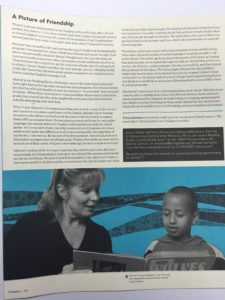Our job as Ahmed’s lawyers is to make sure his story is told. Â Everyone has their own story about who they are. Â Below is Ahmed’s:
Ahmed’s Family
Ahmed Mohamed is a fourteen-year-old boy. He is an African American Muslim and a citizen of the United States. He has a mother, a father, four sisters and a brother. His father is Mohamed Elhassan Mohamed, an immigrant from Sudan who is also a United States citizen.
Mohamed earned a bachelor’s degree in Philosophy while still in Sudan. He also became a clergyman. He is a Sufi Muslim who supported Mahmoud Mohammed Taha, a Sudanese religious leader and engineer who postulated that the verses of the Qur’an revealed in Mecca represented the ideal religion, which would be revived when humanity reached the stage of development capable of accepting this concept. This would usher in a new understanding of Islam based on freedom and equality for all. Because of his unorthodox beliefs about reforming Islam, Taha was arrested by the military dictator Gaafar Nimeiry. He was put on trial, but despite other world leaders attempting to intervene on his behalf, including then Vice President George H.W. Bush, Taha was hanged. As one of Taha’s vocal supporters, Mohamed fled to the United States to avoid religious persecution.
After Nimeiry was overthrown, Mohamed traveled back and forth between the United States and Sudan and settled with his family in Irving, Texas where Mohamed became the President of the Alsufi Center. Ahmed was the third of six children. When he was five, the family went back to Sudan for three years during Ahmed’s first and second grades in elementary school. The kids all became very homesick for the U.S.A. and the family moved back to Irving where Ahmed began third grade at Townsell Elementary. Ahmed graduated from Townsell Elementary, as did three of his sisters and his little brother.
Ahmed’s Early Childhood
When Ahmed started the third grade, he knew no English. The school provided him “reading buddies†from the Irving Bible Church. These volunteers would come and read with Ahmed to help improve his language skills. Because of his language barriers, Ahmed was an “outsider†at school and the friendship of his reading buddies was important to him. They remain his friends to this day.
Ahmed found his love of all things electronic/robotic at an early age. His father, Mohamed, was a business entrepreneur, and included among his businesses was a cell phone/pager company that, at one point, grew to eight stores in the Metroplex. When various of those stores closed down, much of the remaining parts and inventory ended up in the family’s garage and a shed, which became Ahmed’s playground. He would rummage through the treasures there and take things up to his desk in his room where he would make elaborate creations to take to school and show his teachers.
Ahmed began sixth grade at Sam Houston Middle School also as an “outsider,†still struggling with English and eager to impress his teachers. As an African American Muslim, Ahmed was the target of bullying. Kids called him Sausage Boy and Bacon Boy because he did not eat pork. They made fun of him for his religion. Ahmed also made friends and, as is typical of a middle school boy, engaged in a lot of horseplay. One teacher remembers that he and a group of friends would line up on opposite sides of a field, run into each other and then line up and do it again, over and over. They also used to play physical games, such as “the neck game,†where one kid says to another “look!†and if you look, you get slapped in the neck.
Ahmed In Middle School
In middle school, it was common-place for Ahmed to bring home-made gadgets to school in his backpack. He was a member of the robotics club, and he also liked to show off his creations to his teachers. He took home-made elaborate contraptions to school on a regular basis. One of his teachers, Mr. Ralph Kubiak, said that he loved Ahmed and Ahmed’s intelligence, as well as his enthusiasm for elaborate gizmos, some of which looked much like the now infamous clock—a mess of wires and circuits. Even after Ahmed completed Mr. Kubiak’s class, they would still talk in the halls on a daily basis, discussing politics and religion. Kubiak and Ahmed even discussed the Islamic State and other terrorist groups, agreeing that they twisted Muslim scripture to control ignorant people.
Ahmed not only made elaborate contraptions that he took to school to show his teachers, he also fixed teachers’ and students’ broken electronics. On one occasion, when a tutor’s cell phone went dead, Ahmed rigged the battery and brought the cell phone back to life. On a number of occasions, he would take students’ broken electronics home and bring them back fixed.
Ahmed’s desire to impress his teachers was related to his desire to make connections and gain acceptance. An example of this was shared by one of his reading buddies from Irving Bible Church. In May 2010, Ms. Tricia Kinsman wrote an article for IBC’s Chatter magazine describing her relationship with Ahmed back in 2009 at Townsell Elementary. At first she wondered how reading with him for thirty minutes one time a week could make a substantial difference to a little boy that could speak very little English and read none—until she saw what amazing progress he made during that third grade year. She told of an occasion where she went to pick him up from class and he had with him a drawing of a horse that he had made. As they walked through the halls, he showed that picture to a teacher, a librarian and the principal.  “He was so proud of it and they praised him profusely for his talent.†They read their books and she walked him back to class. “As he entered the room, he stopped, turned around and handed me the picture without a word. I fought back tears knowing he was giving me something he was proud of, knowing that he wanted ME to have it, and knowing why.â€
Below is a picture of the article from Chatter.

The Consequences of Ahmed Practicing His Faith
Ahmed practiced his faith, including prayer at lunchtime. Prayer by a Muslim has certain physical requirements, including touching your forehead on the ground. Ahmed would leave the cafeteria to go pray where he could accomplish what he needed to do. One day in sixth grade, the 6th Grade Vice Principal, Mr. Nguyen, saw Ahmed leaving the cafeteria and told him to go back and eat. Ahmed attempted to explain that he was going to pray, but Mr. Nguyen said to go back and eat or there would be consequences. Mr. Nguyen was suspicious that Ahmed did not really intend to pray. Ahmed was required to get a permission slip from his father as well as a certification from his mosque that he was practicing his faith. Mr. Mohamed is unaware of any Christian student required to get certification from their church before they were allowed to pray in school.
Mr. Nguyen was known to have racial bias. In fact, he went into at least three history classes and told the classes as a whole that his Asian children did not give him any problems. He urged the African American and Hispanic students need to be like his children. He stated that the students were a reflection of their race and their parents. These statements were summarized in a complaint filed by one of the history teachers to the IISD Superintendent on May 1, 2015. There was no response to the complaint.
After the prayer incident, Mr. Nguyen began disciplining Ahmed for various infractions, most involving “horseplay†and giving him detentions and in school suspensions. Ahmed was also disciplined by other faculty for infractions involving horseplay and insubordination. He was referred to alternative school for allegedly poking a kid with a pencil and allegedly forcing soap down another kid’s throat. The reality of it was that Ahmed had thrown a pencil to a kid asking for a pencil and when it was caught, the lead poked the skin. In the soap incident, Ahmed and another boy were in the restroom clapping soap in their hands to make bubbles. For these two things, he was sent to an alternative school. Mr. Nguyen told Ahmed that he was going to “follow†him through middle school and even into high school. Nguyen told Mohamed that Ahmed needed to be “taken down a notch.†Mr. Nguyen did, indeed, become the 7th grade Vice Principal when Ahmed went into the 7th grade and the 8th grade Vice Principal when Ahmed went into the 8th grade. Mr. Nguyen told Ahmed “you are not who you appear to be.†On one occasion, Mr. Nguyen saw Ahmed walking out of school and walked up to him and began sniffing him. He told Ahmed he “smelled like weed†and made Ahmed go to the teachers’ conference room filled with teachers, told them all Ahmed smelled like “weed†and had them all sniff him, including the principal. After the sniffed him, they concluded he did not smell like “weed.†Ahmed’s middle school History teacher, Mr. Kubiak, states that Mr. Nguyen “hunted†Ahmed in middle school.The final disciplinary straw for Mr. Mohamed was when Ahmed, in the 8th grade, was being choked by another boy. During the choking, Ahmed tried to push the other boy off of him. As a result, Ahmed was disciplined. Mohamed filed a formal appeal of the discipline and it was dropped. During the appeal, Mohamed let it be known that he believed that Mr. Nguyen was targeting Ahmed and meting out discipline unfairly. For example, immediately prior to the complaint being filed, Mr. Nguyen called Ahmed out in front of the class, demanding to know why he was “smiling.â€
After the complaint about Mr. Nguyen, the constant disciplinary actions ceased. Ahmed continued to try and impress his teachers and began to make real friends. He even had a best friend, who we will call John Doe. They were in the same STEM class and began to build things together. They built a robot in their robotics group. They participated in the SeaPerch challenge. The motto of SeaPerch is “teach, build, become.†In that challenge, they, along with their classmates, built an underwater robot (such as those portrayed on the website). The robot was transported on the school bus to a pool to operate. Ahmed and John became close, trading tools and giving each other parts and pieces to build things at home.
The Clock and Pencil Box
When Ahmed started high school at MacArthur high, he had plans to once again try and impress his teachers, as well as become more socially interactive. He planned on joining the Student Council.  One Friday in September 2015, in Geometry and Architecture, Ahmed saw his teacher disposing of some batteries. Ahmed asked if he could have them and the teacher gave them to him. Ahmed taped the batteries together to simulate a little “sword.†Later that day, in English class, Ahmed was rolling the “sword†batteries down his arm and his English teacher, Ms. West, laughed and asked him what he was doing. Ahmed told her that he was going to build something and he would show it to her on the following Monday.
That weekend, Ahmed trolled the garage for treasures. He found an old 8 ½†by 5†Vaultz pencil box from middle school (still sold on Amazon with animals, butterflies, etc.), a 7 segment display, a pcb board, a 9 volt battery, some wires (from a media player that wasn’t working), a 120-240 volt transformer, a button board and some tools. On Sunday night, after returning from skating with some friends, he soldered the battery connector to the pcb board giving it back-up power. He then soldered the transformer to the pcb board which powers the seven segment display and the alarm clock bell. He screwed the display into the pencil box.  The “alarm clock†would make a beeping noise when the set time was reached. He put the clock in his backpack like he always did. In Ahmed’s mind, he built the clock to show to Ms. West.
Below is a picture of the pencil box.

The Day In Question
On Monday, September 14, 2015, Ahmed took the pencil box out of his backpack and showed the clock to his Geometry and Architecture teacher, Mr. Lemons. Mr. Lemons told Ahmed that the clock was “really nice,†but advised him to keep it in his backpack. During 4th period English, the clock beeped as Ahmed showed it off to another student. Ms. West heard the noise but didn’t know where it came from. After class was over, as Ahmed was leaving to go to lunch, he reminded Ms. West that he had told her he was going to build something that weekend and bring to show it to her. He asked her if she wanted to see it and she said that she did. Ahmed plugged the clock in and showed her how it worked. Ms. West asked Ahmed “is that a bomb?†Ahmed was surprised and confused. In all the many times he had built contraptions and taken them to his teachers, none had ever asked him that. Ahmed replied, “no, it’s an alarm clock, see?†Ms. West then told Ahmed she would hold it for him and give it back at the end of the day. She placed the pencil box on her desk. For the next several hours, the home-made clock was out of Ahmed’s hands. There was no alarm raised, no evacuation, no bomb squad called. Nothing happened at all.
Several hours later, during Ahmed’s college prep class, called AVID, Principal Daniel Cummings and Irving police Officer Robin Howman walked in to Ahmed’s class and escorted him out. They took Ahmed to another room in the school where four more Irving police officers and the school counselor, Ms. Wong were awaiting Ahmed’s arrival. When Ahmed came in the room, Officer Charles Taylor, a school resource officer, said “yep, that’s who I thought it was.†Ahmed found this quite unnerving as he had never had any direct experience with that officer.
The Interrogation and Arrest
Ahmed was interrogated for over an hour by the Irving police despite his pleas for his parents. The Irving police, the Mayor of Irving and the IISD have all represented to the public that Ahmed was “less than forthcoming†during his interrogation. However, Ahmed repeatedly told them that it was an alarm clock, not a bomb, which was true. He repeatedly told them that he had made it to show his English teacher, which was true. The clock functioned as a crude alarm clock. Ahmed never represented that it was anything else, he never made any threats of harm, he never said he had a bomb, he never attempted to scare anyone or cause alarm. Ahmed never misrepresented a single thing. Tellingly, the Irving police eventually dropped the charges for which they arrested him and it was stated that there was no proof that Ahmed had “intent to cause alarm.â€
During the interrogation, Ahmed repeatedly asked for his parents. He asked for someone to help him, his parents, to which he was told that he could not talk to his parents because he was in the middle of an interrogation. Certainly it is not unexpected that a boy being interrogated by numerous police officers and school administrators who were accusing him of illegal activity would be scared, confused, intimidated and want his parents.
During this interrogation, Principal Cummings told Ahmed to write a statement and threatened to expel him if he did not. Terrified, Ahmed did not want to write anything. But because he was threatened and really didn’t have anything to hide, he did write for them that he made an alarm clock and the authorities thought it was a bomb (as that was what they were telling him).
Despite the fact that Ahmed had told them about making the clock, despite the fact that they realized that it was, indeed, a crude alarm clock, despite that fact that nobody—not one single person—alleged that Ahmed had tried to scare them with it, had claimed it was a bomb or weapon or tried to cause alarm, despite the fact that nobody had cleared their classroom, called for emergency protocol or called in a bomb squad, Ahmed was arrested. The officers pulled him forcefully out of his chair, yanked his arms up behind his back so far that his right hand touched the back of his neck, causing a lot of pain. They placed Ahmed in handcuffs and marched him out of the front of the school, four officers grabbing onto him, two on each side holding his hands and his biceps. They put him into the back of a police car. They took him to the police station and booked him as a criminal, with mugshots and fingerprinting—all still without his parents.
As he was being escorted out of the room, Ahmed saw the look on his school counselor, Ms. Wong’s, face. She knew what was happening was wrong. She knew that Ahmed was a good kid. In fact, in the first few weeks of school, Ahmed had already received two separate special tickets or tokens that were given out to kids who exhibited exceptional behavior and that could be redeemed for something special at the counselor’s office.
A “hoax†is “something intended to deceive or defraud.†Ahmed’s Geometry teacher asked him what he had made and he said “an alarm clock.†Ahmed’s English teacher asked him what he had made and he said “an alarm clock.†The principal and the police asked Ahmed what he had made and he said “an alarm clock.†There is no telling how many times that day Ahmed explained that he had made “an alarm clock.†There was not a single person who stated that Ahmed had said anything “intended to deceive or defraud.†As far as what the device looked like, the most telling thing so far (besides looking at it wherein it is incredibly obvious that it is not a bomb) is the Irving police internal email obtained through a FOIA request where the officer candidly chides the others and states “that thing doesn’t even look like a bomb.â€
Ahmed’s father arrived at the police station to find out what was happening with Ahmed. As he waited, Officer Howman came to speak with him. Officer Howman indicated that Ahmed had been arrested for taking a “hoax bomb†to school and that he was being processed and fingerprinted. Ahmed’s father, extremely confused and upset, asked Officer Howman what a “hoax bomb†was, but she would only state that he was being processed and fingerprinted. Ahmed’s father tried to explain that Ahmed was very interested in robotics and creating things, but Officer Howman was unwilling to listen to any explanations.
Shortly thereafter, Officer Mitchell arrived and simply repeated that Ahmed had been arrested for a “hoax bomb†and was being processed. He, too, was unwilling to listen to any explanations from Ahmed’s father and simply repeated the same information over and over.
After Ahmed’s mother and sister arrived, Ahmed’s father asked if he could see Ahmed and find out what happened. Officer Mitchell told him that he could not at that time until the arrest was processed and completed. Shortly thereafter, Officer Taylor brought Ahmed, still in handcuffs, to his family. In doing so, Taylor shoved Ahmed as he walked, directing him to “hurry up.â€
After speaking with Ahmed (while still handcuffed), his father expressed that Ahmed had done nothing wrong and the charges should be dropped. The officers were unwilling to have any discussion about that possibility.
As the family was leaving, they asked for Ahmed’s electronic tablet to be returned, since that had nothing to do with why he was detained or arrested and it was how Ahmed completed his homework. While police memos characterize Ahmed as “yelling†and “rude,†he was neither yelling nor rude, simply attempting to explain why it seemed like his tablet (not the clock) should be returned to him. Surely police cameras will have captured the exchange. Furthermore, police memos complain that Ahmed’s mother and sister were speaking in a language that they did not know and were “saying things that we could not understand.†At the time, Ahmed’s sister was interpreting events for her mother as her mother was not fluent in English. The response of Officer Mitchell was to threaten that if the family did not leave immediately, there would be criminal charges brought against them, too.
The Arrest was a Mistake
Subsequently, the Chief of Police admitted that the arrest of Ahmed was a “mistake†and the charges were dropped.  Nevertheless, the district disciplined Ahmed and placed him on a three-day suspension. Mohamed received an email from Vice Principal Patrick Smith late on September 14, 2015 stating that Ahmed would be suspended for three days from school and “all†IISD properties for violation of the Student Code of Conduct, possession of prohibited items. However, Ahmed had not been in possession of any of the prohibited items on the list.
The United States Department of Justice has opened an investigation into the conduct of the Irving Independent School District, not just with respect to the treatment of Ahmed Mohamed, but regarding its pattern of discrimination. A justice department official stated that “the Civil Rights Division has an investigation into the Irving School District regarding both harassment and the discipline of students on the basis of race, religion and national origin.†That investigation is currently ongoing.
This is one of those moments where “history and fate meet at a single time in a single place to shape a turning point in man’s unending search for freedom.â€Â Will we be faithful to our American principles of equality and freedom or will we let fear and hate prevail, the two biggest evils that will defeat our democracy? History tells us that when we have stood tall and proud for equality and freedom, we have grown as a nation. When we have given in to fear and hate, we flounder. In the words of Abraham Lincoln “America will never be destroyed from the outside. If we falter and lose our freedoms, it will be because we destroyed ourselves.â€Â In the case of Ahmed Mohamed, we have the opportunity to take a stand for equality and for justice, two things that should prevail above all else.














